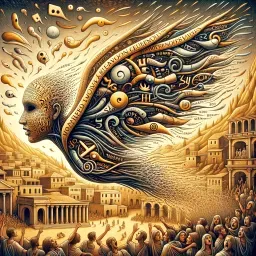Amor vincit omnia

0
0
0
0
- Meaning
- The phrase "Amor vincit omnia" means that love has the power to overcome any obstacle or hardship. Philosophically, it suggests that love is the supreme force in the universe, capable of transcending difficulties and bringing people together. It points to love's transformative power and its essential role in human relationships and society. The notion is that, despite challenges, love remains an enduring and invincible force.
- Allegory
- The majestic figure symbolizes the strength and purity of love, exuding a warm light that represents love's positive influence. Background scenes of human struggles transitioning into moments of reconciliation symbolize love's ability to overcome adversity. The blooming flowers and people's embraces depict the renewal and joy that love brings, while the hearts, hands holding, and doves symbolize different forms of love and the peace and harmony it fosters. This imagery captures the essence of "Amor vincit omnia" by visually expressing how love has the power to transform and conquer all forms of hardship.
- Applicability
- This phrase can be applied to personal life by reminding individuals that love is a powerful and transformative force. Whether in times of personal struggle, conflict, or hardship, embracing love can help overcome challenges, mend relationships, and foster compassion and understanding. It encourages perseverance in love, suggesting that its influence is strong enough to conquer adversity.
- Impact
- "Amor vincit omnia" has had a significant impact on cultural works, including literature, art, and philosophy. It has been referenced in poetry, music, and visual arts, symbolizing the enduring power of love. The phrase has been inspirational, fostering the belief that love can overcome any obstacle, propelling countless narratives and themes that center around love's triumph.
- Historical Context
- Virgil's "Eclogues", the text that contains this phrase, dates back to around 37 BCE during the Roman Empire. The phrase gained renewed popularity during the Middle Ages and the Renaissance, particularly through Geoffrey Chaucer's use of it in "The Canterbury Tales" in the late 14th century.
- Criticisms
- While the phrase is widely accepted as positive, some criticisms argue that it might be overly romanticized or idealistic. Critics may point out that love alone is not always sufficient to overcome complex and multifaceted problems and that practical actions and solutions are also necessary. Some may also critique its use to potentially overlook or simplify serious issues in relationships or society by suggesting love as a panacea.
- Variations
- There aren't many significant variations of the phrase "Amor vincit omnia" in Western culture, but interpretations in other cultures might emphasize different aspects of love's power. For example, in Eastern philosophies, there might be a stronger focus on love as a form of universal compassion or a path to enlightenment.







No Comments